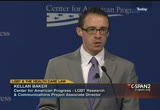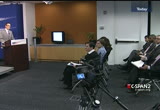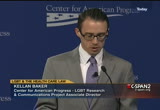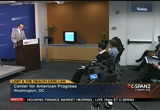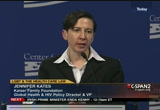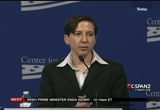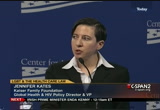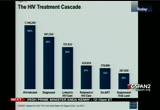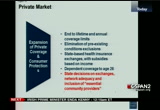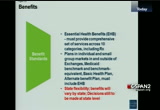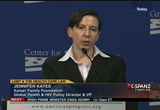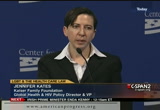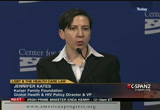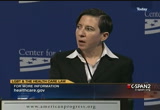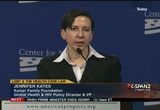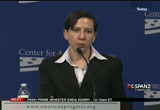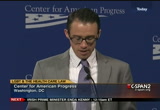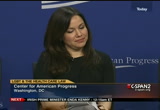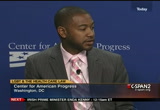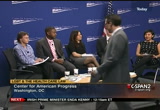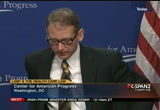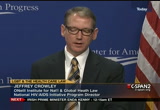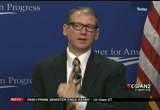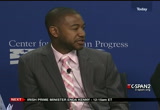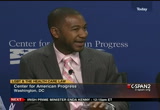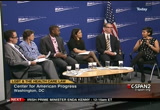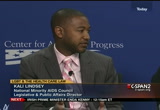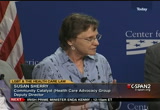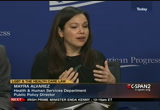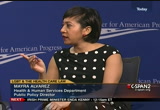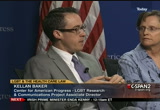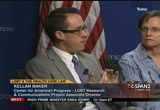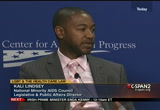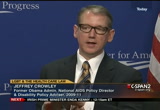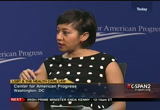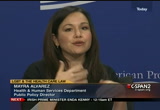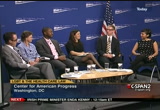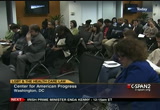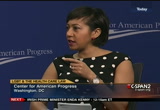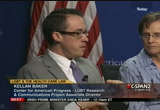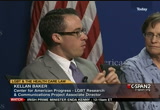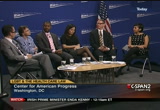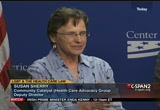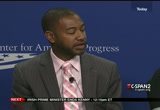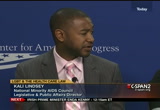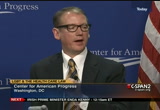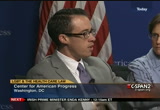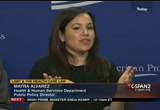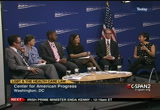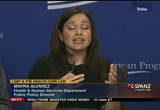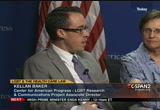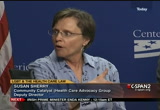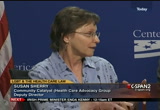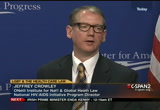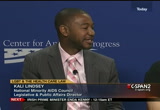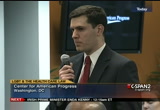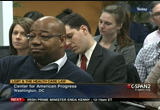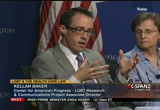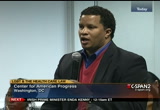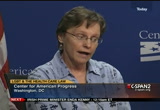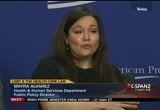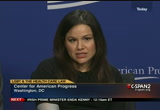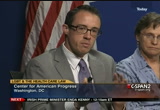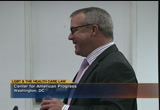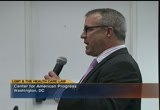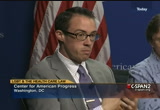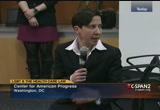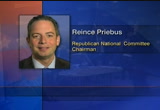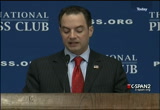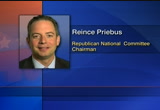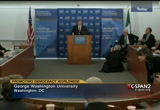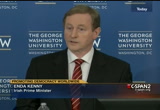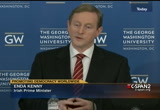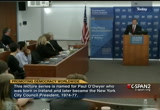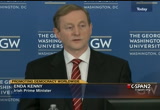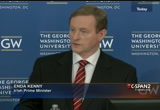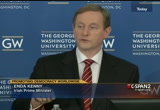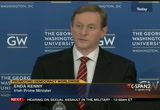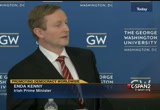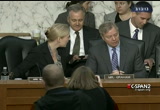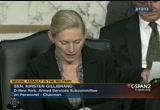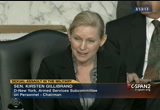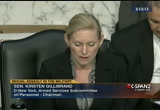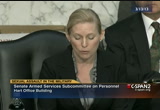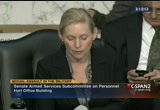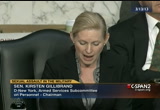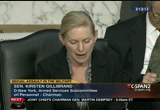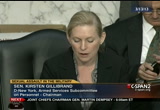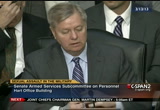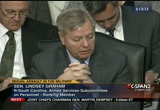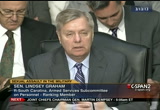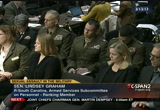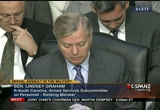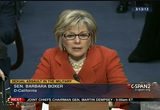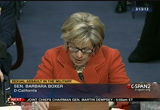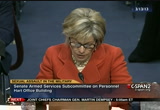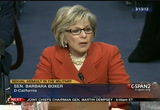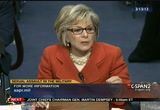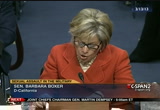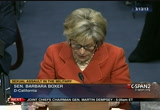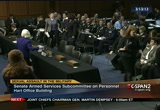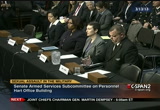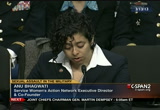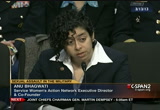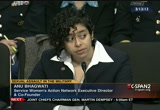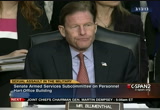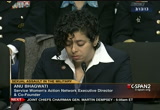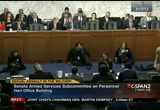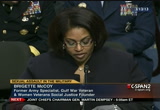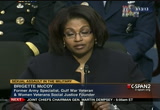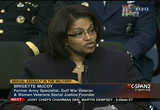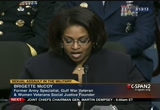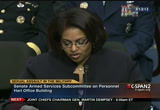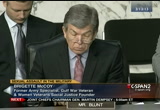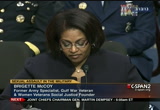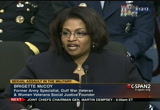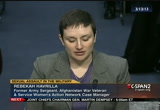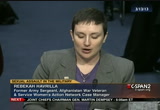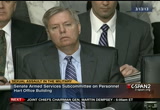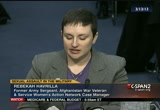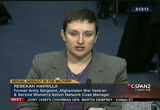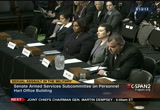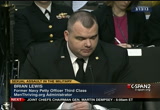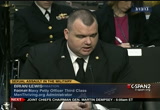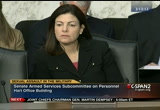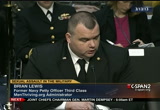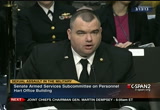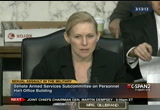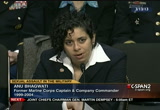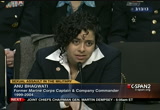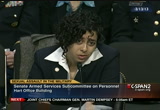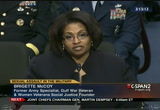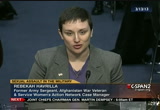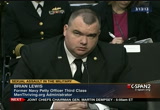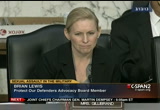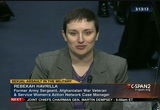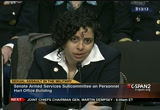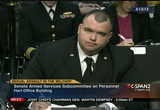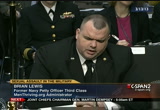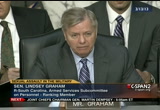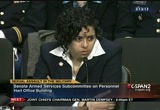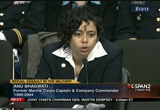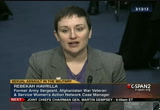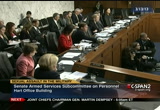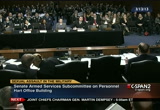tv Capital News Today CSPAN March 18, 2013 11:00pm-2:00am EDT
11:00 pm
is so expensive in the united states is because we are busy paying for it the kind of queue rather than that ounce of prevention. prevention and public health funds to support new initiatives like the community transformation grant program. also makes certain preventive services, including those that are important for lgbt communities because of the disparities that we know. including hiv and other testing. depression screening and tobacco use of screening. the national prevention strategy specifically includes lgbt communities. finally, public and private coverage. obviously related to the previous discussion of the insurance market forms. informal care act will expand
11:01 pm
coverage to an estimated 30 million americans who currently do not have coverage. half of that will be through the expansion of the medicaid program and the expansion goes through arid the new medicaid income eligibility rules will include many people who are pitifully unable to qualify for medicaid coverage. the other people will be able to purchase affordable health insurance coverage and importantly, the marketplaces may not discriminate, no matter where they are on the basis of sexual orientation or gender identity. essential benefits plans cannot discriminate on the basis of gender identity, health condition, or other factors. the marketplaces need to be able to engage diverse communities, including those who may collect demographic data at the point of enrollment, which is particularly enrollment
11:02 pm
important for so many of our populations who don't know the full extent of the disparities because we don't know enough about where our communities are and what they have for experiences and what their needs are. with that, i'm going to turn the podium over to the doctor to give us the rundown of the affordable care act and its effect on people living with hiv and aids. she is vice president and director of global health and hiv policy by the kaiser family foundation. she is a widely regarded expert on global health issues and is known for her work analyzing global health. tracking key trends in the hiv epidemic. she has served on numerous federal and private sector advisory committees, including an institute of medicine committee commissioned by the white house to identify core indicators for assessing the impact of the national hiv aids
11:03 pm
strategy and a health reform law on hiv aids care in the united states. honestly an important connection for us today. this includes policy from the george washington university and a master's degree from the woodrow wilson school of public and international affairs. and a master's degree in political science from the university of massachusetts. the doctor's degree is from dartmouth college. doctor, you are invited to take the podium. [applause] >> thank you. i first want to thank the senator for making progress and including me in this important work that they are doing and making that link between looking at lgbt health and hiv and a portal to act.
11:04 pm
we started off with president obama giving a historic speech speech in 2011 at ending the aids epidemic at some point in our lifetime. this was quite a moment. the moment of opportunity and optimism that i want to start with. the reason the president obama made that statement is because we have a combination that together is something that could turn the tide on epidemics. we also have a national strategy that the white house about a couple of years ago and provides a roadmap.
11:05 pm
more than a million people are living with hiv in the united states. for the last decade, they have been at the same level and perhaps more alarmingly, you and infections are rising by those who represent 66% of their infections in the united states. the impact is quite alarming. they have a heavy reliance on medicaid. most are not on treatment. yet, as i was alluding to, there is new data that shows we can actually get to what many of us are calling treatment that is
11:06 pm
scaled up. it has made a huge difference in helping people live much longer and healthier and has been shown to reduce the risk of transmission by as much as 96% and that is very significant. treatment has clinical benefits in a public health benefit. but where are we in providing treatment in the united states to people with hiv? is called the hiv treatment tactic and it is an important framework to understand how we are doing in reaching the hiv generation. a quarter of the people evaluate this. as you can see from here, two thirds of the people are not even regular care.
11:07 pm
so it's a little hard for you to figure out. some of the key provisions for people with hiv, i will just highlight a few that are particularly important in these areas. there are many more. the annual lifetime coverage limits are very important. it has been a prohibitive factor in the past. and it impacts critical chain for people. and there are other things that are very important for people.
11:08 pm
some of the areas where decisions are being made, these decisions affect people. what does it mean to have essential providers in those networks as part of the law, but what will the benefits look like? a component of the law, which was mentioned, is very critical. very important for people with hiv. up until this point, plans and the small group market, medicaid, medicare, all of the new components will be required to have this standard.
11:09 pm
however, there is a lot of flexibility in there. benefits will still vary by state, which is how health care is today. there are many decisions to be made at the state level. there were two important things that happened for medicare and people with hiv. as of 2011, the assistance program for people with hiv have limits. when they were on medicare and in the doughnut hole, those costs would never count towards the catastrophic level. it was kind of a perpetual spiral and not place that need us to rely on. that was related to the law. part of that doughnut hole will be part of the medicare phasing.
11:10 pm
medicaid is the most important i want to focus on. this is because people rely heavily on medicaid. if you are low income, approximately 15,000 for a single person, that is your basis for eligibility for medicare and medicaid. you no longer need to be a categorical eligibility. this change essentially eliminated this, which says that you are poor, but you're not yet sick enough for medicaid. yet we have medication that not only can prevent you from this,
11:11 pm
11:12 pm
making. here is the map where they are. this is part of things that have been moved. as you can see, 27 had expressed support. seven of them are still weighing options and the rest of them are opposed. what does this mean for people with hiv? perhaps on the good news side, about% of people live in those states that have expressed theirs. 29% live in states with programs. but florida, for example, the florida legislature is not in support. 11% of people with hiv live in florida. as you can see, and i will make this clear, all of those states on the bottom, that as a
11:13 pm
challenge. even if all states were to expand medicaid, we know that insurance covered it alone does not equal access to care. it is the nation's safety net for people with hiv. the resources and gaps in care, we need to look for ways to complete their care. looking ahead, is it expected that this will change. but continue to be critical. what is challenging is that there are many unanswered questions right now to help reform how it needs to change. without knowing which states are going to expand, it is hard to know how the ryan white position is viewed in itself. going forward there is a lot of
11:14 pm
concerns about mainstream health care and bolstering the hiv workforce. disrupting the care is very crucial. some key parts of and challenges of that are part of the lg -- lgbt community. the benefits and what is in play. outreach education and enrollment. you have to inform them of their choices and provide ways to help enroll new coverage where it is
11:15 pm
available. scaling of the workforce is how we can help with this. how will the care be monitored, and medicaid expansion decisions, health insurance exchanges and ultimately the future of ryan white. i will wrap up now and review of some of these thoughts with what the panel has to say. thank you. [applause] >> thank you, for that thoughtful overview. we are going to move now to our panel discussion. our moderator this morning is the advisor for lgbt policy and racial justice and director of the fire initiative that explores the impact of public
11:16 pm
policy on gay and transgender people of color. >> good morning, everyone. thank you for providing a great overview for us on how this benefits lgbt people and people living with hiv. includes the principles of universal design. some are marginalized among us and we are helping to work to get a system that works for everyone. we are we're going to talk about what we can achieve. first we have a distinguished scholar and program director of the national hiv initiative.
11:17 pm
from february 2 through 2009 and 2011. i just received his degree from the john hopkins university public health school. we also have the director of public policy -- excuse me, public health policy and the office of health reform of u.s. of services where she oversees the coordinated and timely implementation of the public-health prevention and health care workforce. previously, the oldest lease share the test was with her for the caucus. she is a master of health and
11:18 pm
administration at the university of north carolina and her undergraduate education at the university of california berkeley. we had advocacy for it federal programs. and the national hiv aids strategy. he completed his work in psychiatry and begin with hiv career in 2003. he shortly learned of his own hiv diagnosis at that time. and we have the deputy director
11:19 pm
who builds consumer participation in the health care system. she has more than 25 years of experience and is responsible for developing and supervising technical-based assistant programs, including health reform. and she teaches a course in community organizing. in 2004 and 2005, she was one of modern health careis 100 most powerful people in health care. she has a masters degree and has a bachelor's degree from the university of massachusetts at amherst and she completed her doctoral. last but not least, yorty know karen decker. she is the director of the predications project here and a masters in public health. in a master of arts from george washington university and
11:20 pm
received a high honors and i do believe that this is a well educated group and the best panel that i've ever had the pleasure to moderate. thank you for being here with us. we just learned that discrimination along the fault lines of social and economic inequality consistently marginalizes lgbt people and those living with hiv and aids. so i want to turn to you first. i would like you to talk to us about the determinants of health like racism, violence against women in poverty, and how they are multiplied as we saw earlier >> yes, this has been the history since the beginning. the country responded with what
11:21 pm
11:22 pm
one other things that surprised me was that people face such a statement. people talk to me about the doctors engaging in what they call observational therapy. medical doctors are afraid to get close to them. so these types of things matter. that the reason i mention this, if you look at that, once you get people having care, the mobile system does a pretty good job having people get on treatment. it is the front end. where we lose 300,000 people after they have been diagnosed and linked to care.
11:23 pm
but they have not been retained in care. so maybe they didn't feel welcome or they couldn't talk about their health conditions. these things play out. getting good care for people is a starting point and a critical point. but it is all these other factors that we need to address. having food and housing and other things. protecting people from discrimination is really important. >> are the particulars of those in the lgbt community, those living with hiv, those living with this statement. >> it comes from their appropriate intelligence. we have really created institutions and environment with access to care. we had conversation and a
11:24 pm
disruption and we also have to acknowledge treatment and trust. it also have access to the system. it is not just going to be about what the benefits look like. but whether we can educate americans that are impacted. we need to have access to these health care services that they need at the end of the day. we are talking about what we know. including age and race. people of color are less likely to experience that in health care system.
11:25 pm
there is a story behind that that we have not necessarily gone to the heart. but we are really going to address health care, we really need to take about this and there has to be a way to address these populations that continue to experience this. our health care is overwhelming impacted by this. we are going to start to appropriate this. >> i think that the fact it is said that, i wonder if that is a the question that we have an answer just yet. like what is the accountability in the system itself and how is a transforming. how do we tackle that.
11:26 pm
>> [inaudible] >> we have conversations about the kind of things that are going into the field and a reformed health care environment. but we also have to address the workforce. part of that is to continue in education and creating opportunities for us to understand the true factors. and they things they can do right now in their own practices many of our providers have kind of monster round in the institutions have really built. so we really need to be prioritized and figure out what
11:27 pm
we can do to do it in a way that is not going to displace these people. >> a lot of policy decisions are being made. >> data collection is going to be part of that. we mentioned data. and it is done state by state or any state stepping up to the plate. decisions about standards. what kind of providers are part of that. those are the decisions being made now will have huge ramifications for how this will play out. what kind of assistance programs will be available.
11:28 pm
how people navigate their decisions about what health plans they are in, when they are going to change plans, what assistance would be available. will the lgbt community be part of providing that assistance. helping people navigate. those are all things that will affect that. there will also be concrete ways to monitor that. >> need to have a two-pronged approach. the first looking at providers and the success that they have and be models of delivery for patients who have specific needs and ensuring that they are integrated into their delivery system. so they are connected with health insurance plans. these are a lot of areas that haven't been looked upon this up on this way. as a result of that, is really
11:29 pm
looking for opportunities to ensure that our providers are ready for 2014 and beyond. coupled with that, looking at our existing network of providers, and other providers that are serving folks and what can we do better to meet the needs of people living with hiv. we have resources in the class standards were evaluated and these are critical tools that providers can have at their fingertips that the federal government can partner with to make sure they are better prepared. >> i would like to come back. before we get into the nuts and bolts, karen, can you tell us about why we are contemplating these conversations? we are talking about lgbt people
11:30 pm
and people living with hiv in the same context. why is it important that we do that? >> i think that there are two reasons. one of them is what we have talked about a lot already. which is the fact that gay and bisexual men, particulaparticula rly those of color, are in the populations that are still rising. .. those people just don't get care
11:31 pm
and to me as a health system has traditionally not been as good a think as many of us would hope that addressing the experiences people who are marginalized or already have poorer health outcomes before they get through the door. so talking about the affordable care act in the ways it is looking at the historic trends of discrimination in the historic trends of exclusion and say we need to change that. we need to promote a culturally competent workforce. we need to promote insurance benefits that means people can get access to care ,-com,-com ma that actually comes from providers who know and who have had training in how to treat them so that we are as a system moving from something that frankly we have party discussed hasn't been serving our population so well that we are actually shifting to incorporating the concerns of lgbt people living with hiv from the ground up as we are building the system.
11:32 pm
>> let's talk about the accountability. it's a road we are going to go down at some point in this conversation but i also think the point of expression of the hiv community will be ongoing as to what services look like. the reality with orion white program is institutionalized with orion white but graham is the process that gave the community authorization and a role in making decisions about what the services look like at the local level that fit their community. access to the programs that they have traditionally had to the ryan white's but what is the accountability. we talked about a lot of discrimination and a lot of the health care expansion or connections that are going to be built into the law that implementation that the devil is in the details of. are those programs actually going to not discriminate or be going to have to -- to set up kind of a monitoring
11:33 pm
that isn't talked about the conversation but what does that look like family to make sure the same control and ability to make sure that the programs and services work for people with hiv and the ryan white's or grammar still going to be available in the program. >> jen mentioned this earlier in a presentation that there is clearly a lot of concern about what becomes of ryan way. we have known that there are people with hiv they need to be covered and medicaid covering folks so the question that i have is how relevant is ryan white and ryan white's dylan do we need the program and what do we need the program to look like as it evolves? >> one of the first things i would say again thinking about what we are doing poorly a lot of the areas we need to focus on are areas where ryan white traditionally has been among the only focusing retaining care
11:34 pm
building complaint here but starting with jen this is an incredible moment of opportunity. the fact that we are talking globally about the end of dates let's hope we can and aids in america first in the way we are going to do that really is to get everybody in care. we can look to the future and we can look at massachusetts. they are a state that has expanded coverage and expanded more than 10 years ago the medicaid program. then in 2007 they got the universal coverage through broader reform. they still have the ryan white program but what it has enabled them to do you a seed use it differently than other states when it seemed they have higher rates of viral suppression and lower incidence than other states so that points us in the direction of how we can use it as a platform and build on it with ryan white strategic lee. >> i would also add that part of the effort requires in order to
11:35 pm
make the shift you have to give people enrolled in coverage and the experience in massachusetts was that it doesn't mean you reach people and populations where talking about require special attention to doing outreach and action with enrollment which is going to require community-based lgbt organizations to become part of the literally community by community outreach and enrollment efforts and to make sure the enrollment system, people are given the support they need to get through to the other end in actually getting the coverage. >> could you talk a little bit more about this and your experience what some consumer health advocates are doing to incorporate lgbt health issues in their work. >> it's an interesting process. there are a lot of advocates have been on the front frontlines with all these issues of medicaid etc..
11:36 pm
now that it's moving into implementation are needing to develop and deepen their working relationships to build new relationships with with the cross-section of community and their relation to the lgbt organ organ -- population and people need each other for this to work right. you need community-based organizations that are going to reach populations. those organizations aren't health care experts. if they don't know the first thing about what a health insurance marketplace looks like let alone what central health benefits or anything else. the expertise is an active community and it's a partnership of the two that is required. that would give opportunities as well. these are some of the decisions. take the ryan white experience and get -- to make that connection bringing in
11:37 pm
experience and similarly the enrollment efforts are not going to be successful without the community-based organizations to participate. >> i really want to emphasize that building awareness and engaging partnerships now, october is months away and that is where people can begin to enroll in plants and compare benefits, compare pricing and be able to find a plan that best meets -- meets their needs for right now we now we can reject organizations to make sure they are where the benefits and aware of what is coming down the pike and what's going to be growing in the future. now you can go to healthcare.gov and sign up for current up to date information about the development in the marketplaces across the country but what we also understand as a lot of people, they don't go to healthcare.gov. they're not aware of government
11:38 pm
web sites and really it's not something they're familiar with so this is why it's crisply -- critically focusing on partners. whether it's their health center or community center or a school. the resources that are already at their disposal if you can link to this information without much in the hard-to-rhard-to-r each communities. we have a marketplace with it which is this i.t. term you can put on your web site so that people are going to your web site they can click on on the web site and immediately go to healthcare.gov with relevant marketplace information and it's much more likely they will go to your web site but for them to get the correct information about this this important opportunity it's important which is why they encourage you all to put that on your web site. stay it's not necessarily the itp because i'm not qualified. talking about the community organizations that are already out there, to your point about
11:39 pm
accountability, there's so much knowledge and expertise and organizational capacity already out there among the lgbt efficacy positions among folks working on hiv among folks who have been doing consumer health work and i think part of the affordable care act implementation for the key piece of it if you will for me is seeing how all of those threats are coming together. because there is so much that is already out there but that's not necessarily a connection that's already made between for example the consumer health advocates that the lgbt advocates because frequently from the perspective of somebody who does lgbt work it's very difficult to talk sometimes about why health isn't lgbt issue and why health is part of that movement for equality that so many people have been participating in. the affordable clay care act gives them a chance to talk about why the capacity of lgbt
11:40 pm
organizations to mobilize people and to talk about what's important in our lives can contribute to actually building and rebuilding a health system that is working or lgbt people, that's working for people living with hiv in trying on the resources of our community to connect them with information and to connect them with care. spevak takes us into, when you think about policy priority issues and advocacy you don't really think of health care. >> i do. [laughter] speier tends not to come to mind so can you talk to us about the connections there. it came up in one of the earlier presentations, and the doma cases and that outcome. >> marriage is a health issue
11:41 pm
from a foundational perspective inasmuch as i mentioned earlier. people tend to be healthier. you have a caretaker in the home and you have the report and it's probably easier for you to get insurance coverage so all of that -- somebody being healthier so marriage equals health in many cases but more broadly as the perspective of lgbt movement and community organizing is that health is really foundational. health is what comes first. it's what you need in order to enjoy the benefits of marriage equality. it's what you need to be able to serve in the military and it ordered to go to work every day and take advantage of protectioprotectio ends we are fighting for to make sure the lgbt folks don't get fired. health is really the underpinnunderpinning, the ground on which so many of our other victories or other old are built and so fighting for the
11:42 pm
ability of lgbt people to be healthy and to stay healthy to protect themselves and their families and their communities is really i think as they said the foundation on which so much of our movement is built and it's just that we don't always talk about it in that way. we don't always tease out the connection between employment or between serving in the military and the veterans health administration. it's important for so many veterans to have access to health care. teasing that out the affordable care act is providing certainly made with what feels like is an unprecedented opportunity to try to tease out some of those threads and say what actually is the connection between health and employment and the military? >> the economic security element
11:43 pm
especially for people or can become quickly as a result of -- your medical debt dad is devastating to whole segments of our society. and also destabilizing to the community. it's the cover just that of how how -- economic security. so there's no doubt the apa will transfer -- transform health care for all of us but what is striking me about the conversation is a fresh opportunity for coalition building and working across issue silos in the ways to get where we don't always do effectively so could you talk to us about what it's like working with religious leaders and others? >> it's been very exciting to see the common ground of people getting out of their silos. one of the first organizations we approach was the oregon
11:44 pm
health care for all coalition. we approach them literally when the marriage debates happened in maryland. they said we can't necessarily agree to take on this project until we are sure of leadership can endorse us taking this on. it was really interesting to watch with the height of the marriage equality today, these are the things that are happening. health status issues and the health care needs going on, the state leaders looked up and said this has nothing to do with marriage equality. everybody has the right to have health care.
11:45 pm
>> how does the apa implementation of the national hiv/aids strategy affects the overlap tangentiatangentia lly and how did those come together? >> one of the things i'm working on is trying to get a greater incorporation from the health care industry for the hiv/aids epidemic. the reality is that organizations have been been doing targeted -- and some of our community health care clinics have implemented routines with a greater number of people in rye and white health care clinics sometimes when they have other -- ryan dwight facility they know
11:46 pm
individuals are interacting with the care system that is somewhat removed from the rest of the health care system and it gives us a unique opportunity to a lie the ryan dwight system with a lot of health care systems available to the rest of the country and more importantly particularly in the context of dealing with the hiv epidemic a young -- among young gay men. traditionally we haven't been able to serve through the ryan dwight care system because those have been legislatively required to be used but now we recognize with prevention. [inaudible] we can reduce the likelihood that they will pass on the infection to their partner. it's the opportunity to engage both individuals and the conversation about hiv prevention strategies incorporated into their own relationships. even more promising to me from the ryan dwight -- combination
11:47 pm
it allows us to. [inaudible] it is one that scares people the most but the reality is that many people with hiv are living longer in their dealing with hypertension and diabetes and a series of chronic conditions and not all can be met to the traditional ryan dwight system. it creates a pathway to provide conference of help to people living with hiv that not only includes -- with the help of their loved ones. >> the president directed strategy were one of the three goals was to increase access to care. and the strategy one of the action steps is to create a seamless system to many labeling people to continue as coordinated quality care said the aca has set the base for achieving that critical goal and
11:48 pm
that actions that. >> another, just going back to the role of the affordable care act and draw the threads together. we see how it's drawing community organizations together as part of the effort to engage our community members in the transformation of a system that's going to happen and whether or not we are paying attention it's going to happen better when we are all engaged in aware. it's also happening in the sense of all of the work that the administration has been doing over the last couple of years to talk more generally about health equity and health justice broadly and how lgbt folks and people living with hiv how we are all part of that system. it's not hiv over here and lgbt over an ordinary people with cardiovascular disease somewhere behind it. it's all of us contributing to a system that is making things
11:49 pm
better for everyone. it's recognizing the ways in which the social determinants are so interconnected for community and how if we are adjusting the needs of those living with hiv or lgbt people as part of a broader focus on prevention, health equities that we are creating a much foundation for moving the conversation forward in the country as a whole without wide the u.s. health care system access and how it's serves our different communities and folks coming from all kinds of backgrounds. [inaudible] >> going back to the discussion about health care and how it's debated and every other major topic of what we are faced with on a day-to-day basis. on a national level we often hear our elected officials talk about creating jobs and building
11:50 pm
better schools and stronger communities. health is connected to every single one of those. on an individual level health is fundamental to opportunity. if you are -- if you're sick and you can't access the services you need your opportunity is less than disproportionate communities of color and lgbt communities are opportunities have been stifled because of the health disparities in our communities for generations. the affordable care act helps break that and really i think our view is the biggest piece of legislation our country has seen his incredibly exciting. when we talk about prevention this is a 2014 and beyond. it's right now. 71 million people with drive insurance today have access to preventive services without cause sharing requirements and that may not seem like a big deal to people but people with private insurance that 40-dollar co-pay or 20-dollar co-pay,
11:51 pm
that's $40 for gas or groceries. it's a big deal to me. i think i went to the gynecologists and was like i get my annual care and i don't have to pay? it didn't occur to me that was aca. >> that is what is so great about it, they were able to translate policy into real action for families today and be able to talk to people on a normal basis about what we are doing to change the health care system for the better. so let's talk about enrollment. it sounds like a good benchmark is coming up later on this year. what can we be doing to make sure populations like people living with hiv and lgbt people are involved in the effort to make sure they are covered and what else should we be doing on the ground? >> today at 2:00 p.m. there is the first national stakeholder call run by the department of
11:52 pm
health and human services where it's completely open to everyone interested in learning more about the marketplace to hear about the effort and what's coming down the pike over the next few months. we strongly encourage upon to participate us harder that cause and we will be part of that discussion. moving forward identifying those opportunities to become better informed about the marketplace. one major and potentially the department is the navigator program. faith-based market places as well as partners and marketplace is the navigator encourage us to be that link between -- in the marketplace tunnel people through the application process to better understand what health insurance plans are being sold and what the cost is and how to compare the services provided and a better understanding of how it can best meet your needs. that's one opportuniopportuni ty. other than that department is providing a number of training opportunities to engage with
11:53 pm
their community partners to better understand the process. a train the trainer approach. the federal government is not going to fail to reach everybody but we know for the work we have been able to do with the chp effort in medicaid and medicare part d. we have valuable lessons are learned to reach hard-to-rhard-to-r each communities and how can we apply those lessons learned? not only on the national level but on a regional basis. we have regional directors and the structures have regional conversation about how to meet the specific needs and if the needs are different from everyone in the state and how can we best -- >> the general message is we are here to recruit you, everyone to get involved because we know it's not just about lgbt folks are people with hiv. more than three quarters of people who will benefit the most from the affordable care act who are going to get enhanced insurance benefits are are going to build a access insurance for
11:54 pm
the first time don't actually know anything about the law and that's true for so many of our communities. i think we are really here to recruit. >> a lot of this work is going to happen at the state level and state taste exchanges for sure. >> the differences between the states? >> one of the differences is in the states running thereon exchange there is a state table and you you're dealing directly with state government. so for instance the state in new york just put out the proposal for navigant's and we we are working with the consumer advocates and the sikh community groups are all learning about that and making decisions about the navigator resources to reference their own connections.
11:55 pm
at the federal level, and the decisions just stay there. about 30 states will be doing either a partnership or have federally facilitated exchange which means advocates and those communities are -- is a two-step russ is. to come together with the state advocacy and state health advocates as people are planning together to say okay what does our state need but then needs to be clean again direct link with the federal government, and looking into the types of connections that mayra is describing and that will be a federal process, the navigator programs and there will be less resources proportionately than the state taste exchanges. so this additional work that will need to happen, the state level for the federal exchanges
11:56 pm
advocates will be trying to coordinate tables together where everybody comes and and discusses how do we do media efforts, how do we two coordinated efforts, how do we do the social media in order to reach the populations and supplement what will be the federal efforts. >> can i just add something? there is so much negative energy for opponents of the aca. one of the things we need is to talk about benefits we are talking to your neighbors because not everybody knows it's a good thing and some people think they should wait. we want people to sign up right away and talking to community-based organizations there are a lot of federal organizations but there will not be a perfect plan handed to you on a silver platter. this is an opportunity for community. he needs to do what you can in her own community and seek out the resources but don't wait until it comes to you. you need to go do it.
11:57 pm
>> we represent over 3000 community-based organizations and one of the things we are trying to do is pass a law putting out a to hhs. it started than well articulated that the cbs have additional role in helping the people that they serve get access to these expanded programs but we need to put the tools at their fingertips. so the council sees its playing a transitional role and putting it in at the fingertips of the people of the at the local level but in addition to that we coordinate the united states conference on aids every year and we are bringing about 2500 front-line health care providers in that meeting this year that will occur at 30 days less than they -- enrollment to get ready to get all of the folks in the aca folks in the acc could leave new orleans on september 11. funny date, right? you can go home and started rolling people in the aca programs.
11:58 pm
>> we have so much information. we are going to open it up for questions for our panelists and also forgen ,-com,-com ma if you have any questions about the presentation too. right here in the back. >> thanks. thanks for an optimistic panel. it's wonderful to hear. my name is justin and most the national assembly school-based health care. i really heard it a lot and i like to understanding the insurance is not access. understanding culture at confident accessible cares important something that the school-based health centers do well. mayra pestered about federal appropriations and i won't do it again but i would like to ask the rest of the panel how you can see schools intervening in the cascade was on how we can prevent kids from being part of that graph in the first place? >> so, one of the hats that of
11:59 pm
the hats they used aware that i don't wear too much anymore so used to sit on the board of an organization called the sexuality of the education -- [inaudible] a long title and i'm glad i got it off. what they have been looking out over the past two years is how we create more of an expanded access to sex education both in the schools as well as community-based settings for individuals that interact with the health education with the public education in a variety of meetings. the reality is that we still have a lot of work to do because they fight on -- is at the local level in many of the same ways as much as the aca fight is but the access to that comprehensive sex ad has to be paired with access to school-based health clinics authorized by the affordable care act and there is to be married thing between the services and programs available and also be instructed to age-appropriate and conference of manner that a traditional program. if we are marrying the two with
12:00 am
the resources by the aca we are mobilizing things like the real act which try to put legislation forward to comprehensive sex education and those i think are some the strategies we can marry the aca expansion efforts with the other tangential and you know cooperative efforts to expand to have comprehensive sex ed as well. >> one of the things the school-based centers really represent for me is there's so much that happens outside of the doctor's office of site of interaction with the provider and that is so clear in school. we know what happens with lgbtq young people and in schools where they are made to feel like they don't belong and other federally qualified health centers and clinics that look more broadly than just the clinical services to talk about what the circumstances that our young people are lgbt people are people with hiv are living with
12:01 am
everything and how those are affecting their health, think that is really a key access as well. >> hi. my name is carrying and i am with metropolitan community churches. i've a i have a question about a christian reform and the undocumented populations. ryan why do such a critical pillar and how services are delivered to people who are undocumented and the vision that you have crafted and the vision you articulating for how implementation doesn't necessarily speak to the barriers that this population would face. it's a highly vulnerable very much at-risk population and community providers are increasingly dealing with large increases in their service population among undocumented so i would like you to comment, for many of the panels about what is the vision for care and where ryan white's fits into all all of that? >> of that?
12:02 am
>> if i could start at would say that is one of the key reasons why we need ryan white going forward. first up we will need ryan white for people who have insurance and 70% of ryan dwight clinics have other insurance so whether it's medicaid medicare private insurance is not doing everything we need so we need ryan white too but also for the undocumented. they are not eligible so we need to make sure we serve these communities. ryan white's developer provided health care services to immigrants and we need to make sure we retain that expertise. >> a tradition that will be relevant to undocumented, to nonprofit hospital community requirement benefits are going to be very important to undocumented populations as is the fact that hospitals now have to report and document their policies to the irs.
12:03 am
those are going to be very important tools and massachusetts the hospital of charity care remains one element for populations that were not covered and that will be true going forward. >> and also, nelson want to make sure we keep our eye and immigration reform. there is also a mechanism to address some of the shortcomings to expand access to the aca to try to work with some of those flaws and immigration immigration reform. immigration reform. spared us want to emphasize that the undocumented are part of our community and part of the people that many of our organization served. they go to school with their children and they work with us. i think first and foremost the administration is committed to passing comprehensive immigration reform and i think like you said that is one of the issues that is outside of the clinical -- so i think let's
12:04 am
keep our eye on the price of prize of comprehensive immigration reform and better identify communities as a result >> right there in the back. >> my name is alyssa. i was wondering kind of services are available for providers who are looking to become more aware of of lgbt and be more trained on it and in more culturally sensitive on the issues? are there any programs out there for providers specifically? >> yeah. there are a variety. samhsa the health administration has a wealth of resources specifically targeting providers to better serve the needs of the lgbt community and her saw with the technical system to better meet the needs of lgbt communities.
12:05 am
we are evaluating the culturally appropriate service standards for care to better meet the needs of the lgbt community. there've been a number of discussions across across the country with lgbt advocates to better address their needs and the provider education materials that the department has available. that is forthcoming but i do think this is a conversation that is ongoing and the partners here on this panel actually have resources available to also assist. >> there are definitely many community organizations that do cultural competency training and in many cases have partnered for example with the federal government and the national health service corps has tripled in size under the affordable care act and hhs has been interested in making sure that those young starting out providers have the opportunity to get lgbt competency training and as i said there are many trainers to do that in various parts of the country. another major resource is the joint commission.
12:06 am
my parents are health care provider so i know all about sometimes a little bit of tension between the standards that are set out in how provider steel they are actually equipped to meet those standards so when the joint commission establishes new standards that include nondiscrimination on the basis of sexual orientation and gender identity they started a project to make lgbt cultural competency materials more widely available so clinicians felt like they have the tools to make a change. there is a monograph from the joint commission and that pulls together a lot of the resources that mayra is mentioned from the federal government and others. >> hi. i'm david with wittman walker health and i'm happy to say that we often the anti-cascade remedy we do traffic work in the community, the hiv community and
12:07 am
lgbt community. we are moving towards being a patient-centered home. huge expense. no money out there to help us get there. we have issues where community-based organizations have that sound business models who suffer at the hands of one organization or entity changing a policy. on one medication we went from a reimbursement model to a replenishment model and it has taken almost $900,000 out of our operating budget in two days. who is out there working across agencies saying as we move towards aca when everybody has to compete on quality, you can't disrupt these business models and expect people to not be impacted all the way through. see you raise a very good point
12:08 am
and i think one of the realities about the affordable care act that it's not going to be perfect when it's implemented on day one and one of the things that we did mention when mayra, i came from a federally -- and understand the transitional is quite laborious but at quite laborious but at the end of the day they provide better patient care to the individuals who are serving. i can't give you a panacea answer. anyone entity looking at these discrete variables and figuring out how to enact each one of them. the more we can try to mitigate some of those consequences at the end of the day. this is in a a new challenge that i am just learning about but if you want to talk afterward i would love to sign sign -- find some ways to try to address it. >> i might also say i don't have a good answer but i think we
12:09 am
know it's going to be messy. they're going to be things that come up that are unanticipated. i also think that's why people need to be engaged. wittman walker health, i am courage -- meant because a lot of these new stakeholders coming into play may not know everything they need to know. and so we all need to make sure there is as much to educate people about standards of hiv karen implications of different policy choices they make but if we do everything we can possibly think of that still it still going to be a messy transition. >> is not an issue to take lightly there for organizations are community members themselves. really i think it does go back to the issue that the rules as we know them are being rewritten right now and if we are not involved as community members and organizations that are affected and groups providing care than we are going to be left out in too many cases and with regard to the lgbt
12:10 am
community is simply that there are so many moving pieces that making sure that the pieces that need to be there and the folks who need to be around the table are there so that our voices are heard as these policies are being crafted in the decisions are being made. >> another example of where that same problem has arisen around different systems not necessarily interacting with each other is example of california which moved early to expand coverage and those unanticipated consequences because sustaining jean in the state medi-cal agency in the rye and white folks were not talking so there were some shins about what would happen to people at hiv. fortunately that was caught and they were able to mitigate it.
12:11 am
part of it is getting your story out there. it's the one of the things that kelly has had the opportunity to do and there will be report coming out, next month in a pro? early next month to talk about all these issues and as you guys has you guys or practitioners have ideas or thoughts or questions that serve as a bubble about how it will be implemented then bring it to us. that is where they're doing to investigate what can we do to resolve some of the kinks that folks aren't thinking about. so thank you very much. all of you for coming out and thank you to our awesome panel. please continue the conversation and they will be here if you guys want to talk to them before you go. [applause] here's a portion of those remarks. you can watch the entire event at c-span.org.
12:12 am
>> in 2008, and 2012 the debates multiplied and were out of the control of the rnc. this cycle there were 20 total debates. the first, eight months before the iowa caucuses. the report contrasts this with 1983 there were six debates and 1988 there were seven. i agree with the co-chairs when they say that they survived to the primary process but they must respect candidates time and help the eventual nominee. so with an eye toward these recommendations, the rnc will embark in creating a system that fits earlier guidelines for a more rational numbered of debates. we will take a leading role in organizing the debates and we will work with state parties and the rules committee to ensure balance in every respect.
12:13 am
the report finds it's advantageous to move quickly to the general election debates in the campaign, allowing the nominee to spend general election money sooner to facilitate that they recommend early your convention so no no more august conventions. our convention planning commission will be tasked with finding the optimal date in addition to improving financing, security, logistics, site selection and the overall programs. we will also take additional steps to make our primary season shorter. spierer marsha morency chairman reince priebus at the national press club. you can watch the entire event at c-span.org. >> coming up on c-span to remarks from irish prime minister enda kenny who is in washington to mark st. patrick's day.
12:15 am
next irish prime minister enda kenny talks about his efforts to reform ireland's government and promote democracy worldwide. his remarks at george washington university on monday are about 35 minutes. on tuesday the prime minster will meet with president obama and members of congress to mark st. patrick's day. [applause] >> ladies and gentlemen, i was
12:16 am
told i was coming to the university and everybody understands all the languages of the world so -- [laughter] i'm going to speak for two hours in irish. [laughter] i wish you all a happy st. patrick's week. it's a real privilege for me to be here in washington to have the opportunity to give the lecture in respect to polydor air and what he stood for and how important and fragile that is. as i say i'm particularly pleased to be able to speak of a great irishman paul of dwyer on many occasions as a new yorker who was a battler for the underdogs and outsiders. he never forgot where he came
12:17 am
from improved it on so many occasions. i want to say a few words on the issue, on the cause of something that is so close to our hearts and people around the world which is our democracy. i am personally honored that the george washington university should be -- bestowed upon me making democracy -- and i do appreciate that. was it not george washington who said perseverance and spirit have done wonders in all ages. here in the united states and in ireland we have the privilege and indeed on too many occasions to many people take our democracy for granted. and it is precisely because we do have democracy that makes our
12:18 am
duty to all those countries and all those peoples struggling to achieve and to assert their democratic rights and make them all the more urgent and indeed all the more sacred. as they struggle to achieve and to assert their democratic rights in many different locations around the world. democracy was integral and central to a all that paul o'dwyer believed in. he was the youngest of 11 o'dwyer's. there were 11. just a short distance from where i live myself. many of his antecedents and any of his counterparts and many of his peers made their way and their lives in the united states. i can personally testify that paul o'dwyer and that mere
12:19 am
phrase give so many people a start. you went to a new place ,-com,-com ma new countrycountry, and it landed was very important to get the start. whether this dart was in the talks, the corporation or the streets of new york or wherever. paul o'dwyer at his office gave so many that start, that step up, that platform. he was passionate about justice, about fairness, about compassion and about human rights. he was passionate too in his professional and his personal pursuit in defense of each of them. and because he was he made a truly magnificent contribution to public affairs here in the united states under the leader system america. that is why i'm very pleased brian to be in your company and
12:20 am
with that mariana. i might say in your professional career you have epitomized the characteristics of your dad in so many ways in speaking out and in standing up for the underprivileged and for those who have isolated for the cause of freedom and liberty and justice. you have proven to be an equally great friend of our country and a wonderful advocate for our country's cause here in the united states. as a proud irishman and proud european and taoiseach, which in the gaelic phrase is g4 leader though we refer to it as plain tee shots. they still young republic of a democracy and all that implies drives everything that i have to do.
12:21 am
given the leadership level comes seldom in the lifetime of people when it comes it has to be grasped with both hands in and their interest in the country's interests. because i understand so many years in politics, the democratic system gives a politician the most powerful weapon that they possess which is the vote and their vote and that is almost in many ways an almost sacred exchange of trust and confidence with fast transformative powers. today in ireland it comprises of two parties the -- party in the labour party with different views on a number of issues and we used those powers in a way in implementing a program to transform our nummy, our public
12:22 am
service and the structures of the system itself. today in europe we have to take those powers and evangelize them and re-evangelize them as part of the european union that is why i know the last two years with 26 leaders representing 500 million people that truth and trust are too essential two essential to progress to achieve democratic societies. so we have to use that democratic energy, that democratic seal to restore citizens trust and confidence not only in national parliaments but in the political and the social ideas of our union that stretches now from the atlantic to the -- right now across the european union many people are really hurting. and they are looking to and
12:23 am
asking their political leaders and their politicians for help and for assistance. in any economic crisis deepest wound and the deepest hurt is a scour of unemployment. facing another day with no hope, with no work to go to particularly for young people where confidence is easily corroded and where more damaging hope is eroded. that is a recipe for disintegration. no european leader can be happy with the situation where 26 million people are registereregistered as unemployed. that is a completely unsatisfactory position and can only and will only be -- by democracy political leaders and governments working in the interests of the peoples of our country's and in an
12:24 am
understanding way that are neither isolated or independent but rather interdependent and interconnected. we cannot and we must not accept the damage inflicted on young minds with such potential of the situation of unemployment. we cannot and we must not allow them to be haunted for the duration of their lives. as they said the european party generally is democrats we cannot allow a generation to grow up believing that democracy has failed them and given them a reasonable chance to contribute to our common humanity. that is why in ireland and the european union we move with all speed to implement the urgent agenda that we have set ourselves on stability and on
12:25 am
growth and on jobs. for those of you who understand the presidency of the european union and you have all had precedence for a six-month carey. each of those presidencies a number of serious issues are -- that is why the agenda for ireland is exceptional in the sense that we have governments previously effective presidencies in the interests of union and we looked to the same toward the end of june this year. we extend the goodwill not just to the peoples of the european union but to the world and our good friends in so many ways here in the united states. the fact of the matter is that the european union and the united states enjoyed the most integrated economic relationship on the planet. we have the most developed set
12:26 am
of economies in western europe that exist and the relationship across the atlantic constitutes nearly one third of world trade. that is why european investment in the u.s. is around eight times that of investment in india and china put together. this basis of its enormous significasignifica nce in today u.s. investment in the e.u. is three times higher than in all of asia so it speaks for itself the potential that exists there. that transatlantic relationship defines the shape of the global economy as well. so it either the e.u. or the u.s. is the largest trade and investment partner from most all of the countries in the global economy that speaks of the centralitcentralit y of the power and the potential for is fair. that is why i am happy from an irish perspective to see the
12:27 am
high-level report produced between the e. u. and the u.s. in terms of potential has received a very positive response. i spoke to the president after his re-election and he addressed this matter in his state of the union address and last week the european council gave the theory positive endorsement to this presidency the mandate to trigger those negotiations which hopefully can take place after the presidency presidency and because there is a nine day process to adopt the u.s. sequestration preview. that's trade relationship has enormous potential. currently 15 million jobs depend on u.s. trade. think of the potential for all those millions of people on either side of the atlantic in terms of expansion of economies potential for job creation and lives to be lived if this were to become a reality which i fully expect that it will.
12:28 am
so long-term evidence will show that the flow of trade and investment helps spread new ideas, new innovation, new technologies and the best research leading to improvements in the products and services. as we look at the global situation with a population globally rising with people tending to live longer because of advances in medicine, the fact of the matter in his we are more interdependent and interconnected than ever before and that is why as part of this presidency and this presidency and the u.s. we hope to achieve that mandate for those negotiations to start. our national agenda in ireland is a small country and is equally urgent. the government is elected.
12:29 am
we had 250,000 jobs lost in the three years prior to that decision in the private sector. our name and our credibility and integrity had -- confusion about the direction our was i was heading in and therefore investment and opportunity was limited. in february of 2011 the people voted and voted to give my government aid resounding mandate to make difficult solutions to fix our public finances ammar structure the way business is done in ireland to work with our colleagues essentially to put our people back to work. because of your sacrifice and their belief and because of their understanding of the necessity to make difficult decisions and because of the clear and strategic plan in place we have made a very
12:30 am
credible starter in rectifying an unprecedented economic situation in ireland. so after years of chronic contraction the economy is now beginning to show promising signs of expansion and a return of some degree of confidence. in fact it's now entering its third consecutive year of growth, competitiveness and and increase competitiveness commit competitiveness brings us back to those 2003 levels and this so-called boom years and international confidence in our country has been restored and leaders and business people and economists and investors look at ireland didn't entirely different light than they did just a short time ago. during the latter half of 2012 the numbers in our economy actually rose over a six-month period for the first time since
12:31 am
2008. clearly immigration is a factor but also the extensive research innovation and clarity and decisiveness of a government perspective that has opened new doors and opportunities. that has been a difficult road for the average people, difficult role for politicians to make decisions like that but very necessary given the mandate to a democratic vote and to have the courage and the confidence to actually see where the higher ground is up ahead. obviously tackling domestic debt levels was part of that. we set out a very clear strategy to do this and trade unions at the moment are considering there are a few on a new -- between management in the interest of increasing productivity to get our debt levels down to have our
12:32 am
deficit reduced to 3% by 2015 because of the fact of a program of assistance from from the e.u. and the imf. we are now actually ranked number one in the world for skilled labor. economic recovery in itself is never in and of itself in keeping with the democratic ideas as for what recovery can do for the people in terms of the social impact of the contribution they can make to their localities into their country. political will, culture and social and economic and that recovery and all its potential has come following a very hard piece in ireland. we have some experience of this and to contribute validly too many contributions around the world. in fact the president made the point that since the united
12:33 am
nations was founded ireland is the one country, the one country small though it is that can validly point to personnel and peacekeepers and in some location around the world on peacekeeping missions and humanitarian missions since the u.n. was actually founded. you are well aware of the troubles in ireland over a 40-year period and how painful that was and how it affected life on our island, brutally and tragically and involved in enormous, enormous scale of response from so many people. the graffiti of hatred was certainly written large over our tiny island and democracy and the pursuit of democratic ideas were an integral part of winning that piece.
12:34 am
and the united states and america was part of that. it might've well divided us. the links for so many centuries were so strong that america is in its own -- pursuit of democracy idea license so many ways. i would call the city in 1990 and 95 and 96 when the clinton administration called meetings between the representatives of ireland and the united states from a business and political point of view. i remember senator george schmidt chilled speaking about democracy. i remember him recalling his own family's involvement because of immigration and his economic circumstances. this country gave him the democratic opportunity to serve as senate leader for 20 years. he was followed at that meeting
12:35 am
by ron brown who tragically lost his life in bosnia in a plane crash sometime later. he said about democracy that george mitchell pointed out he came here to this country because of economic reasons and he spoke of democracy in these terms. he said his ancestors came to america not because of economic circumstances but because they were in chains. at the same time democracy gave him the chance to participate in american life and serve it the highest levels of the administration. it was also evident though through the work of president clinton who refused to give up and often referred to be -- peace comes dropping slow and was also evident in the support given to ireland in so many ways
12:36 am
by so many people in the senate and on capitol hill and both sides of the island deed in those capital buildings. that piece is as much yours as it is ours because of the environment of all of the united states. we know that america will want to sustain that with ourselves and we are very pleased as president obama and his administration is so open and so available and so encouraging and among that piece people with different traditions in different cultures and different aspirations that there is more that unites us than what divides us. it's the responsibility of those of us who have the privilege of holding political office to defend, to underpin, to reinforce its principles, its values and its institutions to
12:37 am
show real leadership where leadership is denied. our approach on the island of ireland is characterized by openness, by respect, by the wish to harness and nurture relationships with those in trouble communities who have the will and ability to work to resolve issues peacefully using politics to succeed where -- never can and that is why in the drafting of the budget for the european union from 2014 to 2020 or the multi-financial fervor we were able to get included a sum of 115 million euro for expenditure on peace projects and divided lines and communities, fragile communities in areas in northern ireland were young men in particular can lead the wrong way with the wrong results. positive engagement can build a virtual cycle of respect for the
12:38 am
honest conversatconversat ions which gives communities an opportunity to see the democratic politics actually do work and give us the impetus to carry on when it seems as it sometimes does that the fear and anger are too intractable to overcome and the that belief and conviction and courage to see these things through to the end. they can be overcome and they have been overcome. difficulties will be overcome again in the future because we have some irish government are are -- of the agreement along with the british government and we are only too keenly aware of our responsibilities in that regard. i had a very good conversation with the british prime minister david cameron just last week and indeed in the same room but the british cabinet sits which is where the treaty of ireland has
12:39 am
negotiated by collins and his people at the beginning of the last century. we want to see peace and prosperity flourish and we want to inject the attempts of any tiny minority is only a return to the emptiness of terror, of bloodshed and murder. we don't want any part of that. that peace in northern ireland is a change for people communities and families and men having the courage is her former president to come to the edge. so in ireland itself, the republic we are undertaking major changes in the way of reform public services and indeed of the political system itself or you in a letter discovered just a few years ago that george washington wrote, the happiness of this country depends much on the constitution
12:40 am
convention which is now sitting. it however can only lay the foundation. the community must raise the edifice. he was perfectly right. indeed, it is in the community and the people that church democratic power lies. yesterday in breezy point there was a community devastated by sandy. here was a community that had devastation because of a natural phenomenon but here was a community that in the context of the old irish word, a community gathered around itself to achieve common objectives where people have suffered. that truce. his outfit and in that particular area yesterday. because when governments rule, governments, and governments go, it is the people themselves who
12:41 am
are the government. with that in mind the irish government set up a constitution convention earlier this year. we will consider a range of matters both social and institutions of the program that recognizes the need for the constitution to reflect the view in the lives of its people. the convention is made up of 100 people, 23 politicians, 66 members of the public chosen through a proper democratic system selected randomly from the electoral register and to help make it representative of a broad society, in terms of gender, terms of age and regional balance and so on. that convention this setting a program of this word. a time when the gap is growing between people and politics, this is a new opportunity for
12:42 am
citizens to become involved in what is important innovation in our shared public life. so through her constitutional convention, the same washington so many years ago, i resent us received a sons and politicians from north and south are coming together to discuss constitutional reform and a new concept in a new way and the constitution and the convention has made a number of recommendations. equally as government we plan to undertake major reform of the legal system itself within the terms of our parliament, our senate and/or local government where we see time for real change. because if you ask people in their homes in and their business at communities across the country to make big changes and to make sacrifices it's going to be obvious and important that the political process itself take a dose of
12:43 am
their own medicine is the as the case might be. in november last, the irish people went to the polls and may democratic history. you know of my three political ambitions. the first is by 2016 we make our country the best to do business and secondly, the best country in which to raise a family and thirdly the best country in which to grow old with a sense of dignity and respect. we are also aware of the difficulties and the hardship the devastation wrecked on families because of child sexual abuse and the fact that the children in ireland in many cases over a number of years did not have the facilities made available to them. so at the stroke of a pen last november the irish people voted through the democratic right to
12:44 am
put into our constitution recognizing children in their own right as being part of our society. that follows on the appointment of the first senior minister for children in the history of our state showing the importance and the priority. that is just part of the range of activities that we are involved in, respecting the rights indignities of the children of ireland. i hope the reforms we are undertaking is a government in terms of democracy then and make it more accountable, more trance trance -- and more open. in his oath as the first president of the united states, george washington spoke of the importance of priesthood and that in turn said these
12:45 am
precedence may be fixed on true principles. that was absolutely true. as i said, truth and trust are two of those principles that are important in democracy. it was martin luther king who said in respect of political responsibility, cowardice asks the questions is it safe? vanity asks the question, is it popular? experience -- expediencexpedienc y asks the question is if -- but conscience asks the questio? i suppose for everybody in politics there comes a time when you have to make decisions and take the position that is neither safe nor popular nor political. but because it's right. the very same principles like in
12:46 am
america the republic of ireland has strived to live and to work and to thrive according to the highest democratic tangibles. paul o. dwyer said fierce, proud and fight for people's conscience. to strive it said guerrilla fighter for a jewish state to the rebels of his beloved ireland, a fight across the spectrum. he was an eloquent battler in the name of conscience and he said you know ideas should always come first. this is true. democracy is a fragile flower that when nurtured gives immense strength. i was struck by this yesterday.
12:47 am
in the explanations given about the freedom tower and the site where the towers stood. in front of those affected, where the site was there is a pair of trees. one tree that was discovered still alive if it were in the rubble of the collapse of the trade towers in that tree was brought to van cortlandt park and nourished and treated and is now for ching again in the location where it was originally the tree that will bloom and blossom for many of the others in that project or patch, a symbol of of what democracy can do when it is treated and nourished to allow it to flourish. so, for paul o'dwyer from
12:48 am
county -- said i.t. should come first. for me, a more important line from paul o'dwyer was when he said politics are the only machinery around on which you can really straighten things out. that is what we are about here. in ireland and the united states and around the world or as they would say sort it out and straighten it out. so i'm very happy to give this word about a man that i admired and that i met on a number of occasions and my abiding memory of paula dwyer was when he came to the local authority and honored him with a city reception.
12:49 am
and there he sat in the chairman's big letter chair with a man of hair with his eyes like beacons of democracy saying we should exercise the ghosts of the past the ones we have been fighting for so many years and at the same time he lashed out at everybody and not local authority saying these are the things that you should do. as you say brian, he never forgot his roots and it is my true wish to follow in his footsteps in that regard. thank you very much. [applause] the head of the federal housing finance agency will testify in housing issues including government mortgage financing by fannie mae and freddie mac.
12:50 am
nexa senate panel looks at how the u.s. military investigates and prosecute sexual assault cases. we would hear from military lawyers and witnesses who testified that they were victims of sexual assault while serving in the military. this senate armed services committee hearing is for hours. >> thank you all for joining us. it's an honor and a privilege to
12:51 am
chair this hearing of the personnel subcommittee this morning. i want to thank ranking member of the subcommittee senator lindsey graham for his part and working with me to move this hearing forward as quickly as possible. i know that all of our colleagues in the armed services committee share our deep commitment to improve the quality of life of the men and women who serve in our all volunteer force on active duty or the national guard reserve, their families, military retirees and the department personnel. and that is why this hearing today is so important to me personally and to thousands of servicemembers and their families across this country. the issue of sexual violence of the military is not new. and it has been allowed to go on in the shadows for far too long. the scourge of sexual violence in the military should be intolerable and infuriating to all of us. our best ,-com,-com ma brightest
12:52 am
and bravest joined our armed forces for all the right reasons, to serve our country, to protect our freedom and to keep america safe. the united states military has the best in the world and the overwhelmingly vast majority of our brave men and women serving in uniform do so honorably and bravely but there is also no doubt that we have men and women in uniform who are committincommittin g acts of sexual violence and should no longer be allowed to serve. too often women and men have found themselves in the fight of their lives, not in the theater of war but in their own prank among their own brothers and sisters in ranking officers in an environment that is enabled sexual assault. after an assault occurs an estimated 19,000 sexual assaults happened in 2011 alone according to the defense department's own estimates. some of these victims have to fight all over again with every ounce of there being just to
12:53 am
have their voice heard. and then to fight for the disability claims they deserve. congress would be derelict in its duty of oversight if we just shrug our shoulders at these 19,000 sons and daughters, husbands and wives and mothers and fathers and did nothing. we simply must do better by them. the brave men and women volunteered to serve in our military they know the risk involved with sexual assault at the hands of a fellow servicemember should never be one of them. it's not only the sexual assault causing conscionable harm to the victim of sexual assault is reported to be the leading cause of post-traumatic stress disorder among women veterans. sexual assault in the military also destabilizes our military, threatens our unit cohesion and
12:54 am
national security. beyond the enormous human cost from psychologically and physically causing significant assets making us weaker both morally and militarily. already this committee took some first steps on this issue as part of last year's national defense authorization bill that president obama sign. while obviously our work is not done, i'm hopeful that we can build up some of these initial changes which included one insuring that all sexual offenses in the military are processed and discharged or dismissal from the armed forces regardless of service and second remove authority from the immediate commanding officer of the sexual assault cases which is one of the issues we will look into today as to whether we need to remove such authority entirely from the chain of command to place in a trained prosecutor and state.
12:55 am
we pushed to lift the combat ban that prevents women from officially serving in many combat positions that can lead to promotion opportunities by opening the door for more qualified military. we have increased diversity and top leadership positions improving response to leadership when it comes to responding to sexual assault only passed an amendment introduced by senator changing based on our legislation which means troops that do become pregnant as a result of a rape no longer have to pay out-of-pocket for those pregnancies to be terminated. concerning our first our second panel of witnesses after we will hear from senator barbara boxer who has an extraordinary passion and leadership on this issue, our second panel will be of men and women who are going to tell their personal stories and i want to salute each and everyone of you for having the courage to tell such painful and personal stories. it's my hope and belief that by committing the selfless acts you are encouraging others to step forward and are also helping to
12:56 am
prevent crime going unpunished. we have a duty to you and thousands of victims you represent to stand and what is the most effective and fair system that can be. despite very dedicated j.a.g. officers i do not believe it adequately meets her sandra. the prosecution rate are devastating. of the 2439 reports filed in 2011 and sexual violence cases only -- major trial. a system where less than one out of 10 reporter perpetrators are taken to trial for their alleged crimes is not a system that is working and that is the report of crime. the defense department itself for several number closer to 90,000 a system where in reality closer to one out of 100 alleged
12:57 am
perpetrators are faced with any accountability at all. that is entirely inadequate and unacceptable. my view is that emphasizing institutional accountability in the prosecution of cases is needed to create a real deterrence to criminal behavior criminal behavior. the system needs to encourage victims to come forward and participating in their perpetrators prosecution is not detrimental to their safety or future and it will result in justice being done. currently according to the department of defense 47% of servicemembers are too afraid to report their assault because the fear of of retaliation, harmer and just punishment. too many victims do not feel that justice is either likely or even possible. we need to take a close look at the military justice system and we need to be asking the hard questions with all our options on the table including moving this issue outside of the chain of command so that we can get closer to the reality in our services.
12:58 am
the case would have already about is shocking. the outcome should compel all of us to take the necessary action to ensure that justice is swift and certain, not rare and fleeting. i had the opportunity to press secretary haeckel ons sexual violence and secretary haeckel responded by saying i agree it is not good enough and the whole chain of command needs to be accountable for this. i couldn't agree more perilous pleased that he is open to changes to the military justice system as well as legislation that would ensure effectiveness of our tube crime of sexual assault. in light of the audano case to be made by march 27 is the first step. after ranking member graham makes opening remarks weevil hear testimony from senator barbara boxer who has been a
12:59 am
leading voice on this issue. in last year's defense she successfully included in a minute that prohibits any individuaindividua l convicted of felony sexual assault from being issued a waiver to join the military. we will then have the following witnesses who have been either a victim while serving in the military or knowledgeknowledge able advocate for addressing the issue of sexual assault in the military. i will now differ to senator graham to give his opening remarks. see i want to thank the senator gillibrand to having the hearing 47 or 49% feel intimidated to come forward because they think they may face reprisal, something that is obviously wrong. having said that, the purpose of military justice is to instill good order and again is so that when they are called upon to rain gauge the enemy and to train and deploy together they can do so in the most effective
1:00 am
fashion possible. the military's unique place is not a democracy but a place where you're asked to do extraordinarily difficult things and you have to count on the people to your right and to your left to be there when you need them and vice versa. in the military we have a crime for a commander to have a personal relationship, sexual in nature or otherwise, overly familiar relationship that can be consensual -- though that would be consensual. it's called fraternization and we probably should look at that policy as well to make sure that we are dealing with fraternization cases in an appropriate fashion. ..
1:01 am
1:02 am
i cannot think more disrespectful measure than taking advantage of someone were physically violating them. that is just absolutely not only a crime, but it is an ultimate detrimental demise to have such conduct breakout. the reason that we want to prosecute people who do that is because they are destroying the units and they are the bad guy. now, having said that, i have been a military lawyer for 30 years. another problem that can hurt a unit is for somebody to be wrongfully accused and feel like they have no voice and the system will go from one extreme to the other. but the end of the day, military justice is about rendering justice in an individual case. always the theme of military justice is to make that as
1:03 am
effective as possible, to maintain good morale and discipline. if you are a female in a unit, you feel that you are -- that nobody cares about what happens to you. also, if you are in a unit or people may misunderstand what you are saying and you feel like you can't defend yourself, we have to find a balance here. thank you for coming forward, to the victims. i know it's not an easy thing to do. the numbers are astounding. if we will continue to be the most defining force for freedom in the world, we will have to solve this problem. as long as you have human beings, you have problems. but clearly, the message we are sending is that we are way too indifferent. but your complaints are following on deaf ears to all of our commanders.
1:04 am
how can you leave your unit if people in the unit feel like the system does not care about them. i will do everything i can within reason to make sure that that stops and if you are accused, you still get a fair trial. >> senator boxer? >> thank you, madam chairman and ranking member. thank you both for holding this critical hearing. thank you for this opportunity to testify. i am here to talk about disrespect but not false charges and charges in the way they are handled. as you know, congress passed the
1:05 am
bipartisan effort for violence against women act. i'm so proud of president obama cited in flawlessly. that while recognizes that every human being deserves protection and send an unequivocal message that if the sexual assault occurs or in a religious setting, yes, the offender must be punished. sexual assault is a heinous and violent crime. it must be treated as such. it is a violent crime and it must be treated as such. i want to thank each of you for supporting this amendment that said no, the military cannot
1:06 am
take offenders. people that have been convicted of sexual assault. that will help us going forward. but we need to do much more. we know this crisis is staggering. despite some important reforms by the department of defense, they are trying to improve prevention, prosecution, and too many perpetrators go unpunisheunpunishe d and many do not get the justice they deserve. as the chairman said, this is unacceptable and it must stop and we are the ones who can stop it. and you particularly are the ones that can stop it. well, in response to a letter, the defense secretary is committed to taking a hard look at the military justice system. he agrees that much more must be done to combat military sexual
1:07 am
assault. i don't have all the answers. if i had all the answers, i would tell you them today. one thing i do know is that immediate steps must be taken to prevent senior commanders from having the ability to unilaterally overturn a sentence by a court. i would like to thank senator mccaskill who has introduced legislation to do that. that is the first step in only the first step. two recent events i want to share with you highlight the need for dramatic change. the first case involves a decision by an air force lieutenant general to dismiss charges against lieutenant colonel who was convicted of aggravated sexual assault. again, all you have to do is listen to senator mccaskill's comments to understand how deep this helps us. many in congress were stunned to
1:08 am
read that the general use his discretion as the authority to try out a military jury. the jury has high-ranking military officers. a lieutenant colonel was sentenced to year in prison and dismissal from the air force. under the uniform code of justice, the general suspicion to overturn not his final. it cannot be reviewed or changed. now, the second event that i want you to hear, because you may not notice, it took place in my home state of california. last month, an army veteran shot and killed two santa cruz police detectives who are attempting to question him over a sexual assault allegation. in the aftermath of the shooting, we learn that even though the former soldier had
1:09 am
faced two separate charges while serving in the army, charges against him were dropped and he was discharged without a conviction as part of a plea bargain. now what is it going to take to convince the military that sexual assault is a violent and vicious crime. but those who perpetuate it, they are capable of other bodily harm, including murder. what will it take? it is a vicious and violent crime. those capable of that are capable of other crimes as well. these examples speak for themselves. there are so many more. you will hear them today and your heart will break. it is time for us to take swift and decisive steps to ensure that this does not rest solely in the hands of one individual. it is not enough that our military says zero tolerance for sexual assault. you can say anything.
1:10 am
you can say anything. but the facts speak for themselves. the department of defense estimates that 19,000 sexual assaults occur in the military. i would like to point out to my colleagues and my friends that many of these cases, only 17% of these cases are ever reported. i am grateful. i am so glad that you chose to hold the subcommittee on military sexual assault. i look forward to working with you on solutions to this problem. today's hearing is the first in nearly a decade. it is high time, not only for this hearing, for changes in the way the military handles these changes. i know that we, all of us, who are touched by this issue, i went to work with our colleagues and with the military.
1:11 am
the military wants this to go away most of all. we have to end this terrible tragedy of sexual assault and think of what an amazing legacy it would be if we succeed. even more important, think about how many men and women we would rightly protect. thank you so much. i am very excited about this hearing. i know what your leadership, the two of you, we can get this done. thank you so much. >> thank you, senator barbara boxer for your strong testimony. we are grateful for your leadership. we are now going to welcome the next panel. you can come up and i will read a biography while each of you get settled. we have the executive director and cofounder of the action network. she served as a marine officer from 1999 until 2004.
1:12 am
all serving in the military, she witnessed sexual violence. we have bridget mccoy who served in the u.s. army from 1887 until 1991. she was just 18 years old when she signed up. she was sexually assaulted by non-commanding officer. rebecca is a former sergeant in the u.s. army. he she served from 2004 april 2008. she was the only female member of a bomb squad in eastern afghanistan and was attacked by a colleague at the operating base near the pakistani border in 2007. we have brian lewis, and he enlisted in the u.s. navy in june of 1997. he was raped by a sucker noncommissioned officer and i
1:13 am
encourage each of you to express your views candidly and tell us what is working and what is not working. help us to understand what we can do to help this problem of sexual assault in the military. we will hear your opening statement. you're prepared statements will also be included in the record. we will limit our questions to seven minutes. [inaudible] >> thank you. good morning. i am the executive director of service women's action network and a former marine corps captain. swann's mission is to secure equal opportunity and freedom to serve without discrimination or harassment or assault to ensure high-quality health care and benefits for veterans and their
1:14 am
families. military violence is a personal issue for me. during my five years as a marine officer, i experience daily sexual harassment and i was exposed to a culture, life with sexism, jokes and widespread sexual exploitation of women and girls in the united states and overseas. my experiences came to a head when i was stationed in north carolina from 2002 april 2004. eyewitness reports of rape and sexual assault and sexual harassment swept under the rug by a handful of officers. perpetrators were promoted and transferred to other units without punishment. victims were accused of lying or exaggerating their claims in order to ruin reputations. as a company commander, i chose to sacrifice my career by filing
1:15 am
an equal opportunity investigation against the offending officer. i was given a gag order by my commanding officer and got a military protection order against the officer in question. lived in fear of retaliation and violence by the offender and my own chain of command. and then watched in horror. the offender was not only promoted, but given command of my company. many of the women who were impacted, including me, are no longer in the military. however, all of the officers who are complicit in this, have retired or are still serving on active duty. i was devastated because i loved and still love the marines. i wish my experience was unique. in the last two years, the hundreds of cases that we handle each year, i have discovered that rape and sexual assault and harassment are pervasive throughout the military. sexual violence occurs today in operational and non-operational
1:16 am
environments and combat arms as well as support units and affects both men and women. the department of defense estimates that 19,300 assaults occurred in 2010. that while 800 thousand victims were female, someone men as well. so let's be clear. rape and assault, they are violent dramatic crimes. not mistakes. the professional judgments, not leadership failures and mistake. the professional judgments, not leadership failures and not oversights in character. rape is about power and control and intimidation. thanks to a surge of pressure over the last few years by advocates of the media and congress, military leaders have
1:17 am
been forced to reckon with the issue of military sexual violence. some protections have been part of mandatory transfers were victims or a pilot program which assigned each victim with special victims counsel. yet, while these measures help a victim after an assault, it will not prevent sexual violence nor change the culture that condones it. military leadership cannot solve the problem on its own. i urge congress to enact the following reforms going forward. first, congress should grant authority over criminal cases for disinterested prosecutors, commanding officers cannot make these partial decisions. in recognition of this, the number of, countries have already transferred cases away from commanders to prosecutors.
1:18 am
including the right to a fair and impartial trial. second, open the civil courts to military victims. civilian victims including dod employees, have one critical avenue that is currently unavailable to uniforms personnel and access to civil court. to this day, u.s. supreme court and the federal court below it continued to maintain that service members are barred from negligence or intentional discrimination against the military. depriving it for violations of their rights. congress must ensure that men and women in uniform can access the remedies available for all other individuals under the civil rights act. those who report incidents of absence, the absence of these
1:19 am
remedies is especially shameful. today we are looking at an institution that desperately needs to be shown the steps forward. senators do not need to begin survivors. thank you. >> thank you. >> thank you very much. >> thank you for having me here. i have deep gratitude towards those who have worked tirelessly for our voices to be heard and those listening with compassionate and open hearts to make positive changes towards the matters at hand, change needs to come from the roots. i'm a gulf war era veteran. i was raped during military service and during my first assignment. that was 1988 and i was 18 years
1:20 am
old. it was two weeks before my 19th birthday. this happened in a foreign country away from american soil while i was stationed in germany. i did not report it. that would not be the last time that i was assaulted or harassed. one of the 19,000 men and women every year here similar stories. the same year that i was raped again, by another soldier in my unit. another year i was sexually harassed. by a commissioned officer in the unit. by 1990, between 1990 and 1991, another nco in my unit began to
1:21 am
harassment or inappropriate touching and words and behavior. he then requested that i work directly for him where there was no access, coated vaults, windowless entries. upon receiving my new schedule, i can only compare the anguish of this to being constantly molested by a person of authority. i was at a mental and emotional collapse. a senior woman anzio. in my unit, she helped me to write a witness statement to present my command and file a formal complaint. the complaint that was answered by no official hearing or were written response and it would only be answered later with a verbal response, which asked me what i want. and that i had misunderstood this nco's intention towards me.
1:22 am
the only thing that i wanted at that time was two basic things. the first was an apology and for the harassment to stop. that is all. i did not know what was happening. at no time did anyone move forward with my formal complaint. nor was anyone willing to discuss the process with me. they did remove me from the team and he drives in turn would drive by me on base and say sorry. that was his apology to me. in the days that followed, was verbally and socially harassed. put on extra duties that conflicted with my medical profile and eventually i was given a choice to get out were to face possible action myself.
1:23 am
most women who are victims of sexual harassment are charged with these actions. i thought that i had no choice. i was literally terrified. in that terrified state and imposition, i was paralyzed and i just chose to get out. that is the option that was given to me. within a week, i had been ordered out of germany and was escorted by two ncos to my plane, and that was it, my career was over. please note that in that unit, i was not the only one who was sexually assaulted or harassed. many women came to me and said that they had had the same situation happened, but they never told me who did this. returning to the united states was difficult. i have a lot of negative behaviors that got carried over from the military.
1:24 am
i was anxious and overly protective and i became suicidal and had suicidal attempts. i went through severe depression and had multiple severe incidents and was unable to carry on the rigors of work, for which i was highly trained for. i repeatedly moved from place to place. i was homeless and medically disabled. but not even the va would recognize this and help me until some two decades later. i lost many material things and emotional relationships in my lifetime and struggled with my fate. i grieved because i felt like i was a lucky one. i left my unit alive. with an honorable discharge. although discombobulated and scared for my life and my future, many left with less than honorable discharges and personality disorders on the record, further hindering him. some like a woman i know don't come home to their parents live. twenty-two years later, almost to the day, i was awarded
1:25 am
veterans service compensation for sexual trauma. can you tell me why did it take so long? why did i have to go through so much before anyone would listen to me? why did i have to be violated again and again through the process of asking for help and seeking claim status. today, and this helps to ground me, i volunteer to different veterans organizations and outreach foundations and i have participated to help organizations like the sierra club to better understand the many facets of this for programmatic purposes. many men and women have been affected. i am an advocate for social justice and i collaborate with both community and other organizations.
1:26 am
i speak and have spoken at the surgeon general's task force for suicide prevention because suicide and homelessness are two huge issues in the military sexual trauma community. with the claims denial and lack of purpose for medical treatment exacerbating those issues. of course, ptsd is the main contributing factor. i have to say that i no longer have any faith or hope that the military chain of command will consistently prosecute and convict and sentence and carry out the sentencing of sexual predators in uniform without with just a somehow. only 8% are prosecuted. how many are relieved of their duties in pensions and careers remarked how many of them are paced on the national register of six offenders before they return to regular life? let's not allow sexual predators
1:27 am
who happen to wear uniform the opportunity to become highly trained sexual predators. let's make sure that they are listed on the national registry and let's do this before they go unnoticed in our communities to further harm our service members and community and family members. sexual assault and, as deep and broad roots in the military. let's not just trim the branch. let's deal with this from the root. please make it stop. >> thank you. >> next witness? >> good morning. i'm currently the outreach and education coordinator for the service women's action network. i previously worked in providing referrals for 600 veterans with
1:28 am
sexual assault and sexual harassment. these included getting, claims accepted, overcoming homelessness, and finding mental health care. i grew up in south carolina before i joined the army in 2004. i was a technician and achieved the rank of sergeant in three years and three months. i was deployed from 2006 until 2007 in afghanistan and spent my time and eastern provinces where i was assigned. i worked on ied response and intelligence operations. i was awarded the joint service commendation medal while it was deployed and was given an army achievement medal and good conduct medal for i left. my deployment brought more than just the stress of occupational hazards. one of my team leaders continually sexually harassed me and was sexually abusive towards
1:29 am
me. this behavior cost me so much anxiety that i ended up self referring to mental health and on medication to manage not just the stress of my deployment, but also the stress of having to live with an abusive leader and coworker. one week before my unit was scheduled to return to the united states, i was raped by another service member that i've worked with our team. initially i chose not to do a report of any kind. i had no choice in my chain of command. as my first sergeant previously had accusations against him and the unit was sexist and hostile towards women. after disclosing this to a few close friends, i filed a restricted report against my team leader and had no intention intentions of doing a formal investigation. i began a job as a contractor and ended as a river reserve and tried to start a different life for myself. reintegration was challenging and i had few to rely on. i struggled with depression and
1:30 am
the effects of post-rock stress. approximately a year after separating from active duty, i was on orders for job training and during that time i ran into my rapist in the store. he recognized me and told me that he was stationed on the same installation. i was so traumatized from seeing him that i removed myself from training and sought the assistance from an army chaplain who told me among other things that the rape was god's will and that god was trying to get my attention so that i would go back to church. ..
1:31 am
1:32 am
process traumatized me. the institutional system failed mean miserably. my perpetrator went unpunished even the wood knitting it and to account -- commanders were never held accountable be needed justice system run by professional legal experts not commanders. also an additional system to allow victims when it fails them. without those criminal justice reform military sexual violence will be widespread. thank you for your time. >>. >> members of the subcommittee thank you for holding this hearing today with sexual assault in the military i am humbled disappear before you as a
1:33 am
first male survivor to testify on this issue. thank you for allowing this privilege. i want to take a minute to sink my partner and those of survivors of military sexual trauma and also the parents and caregivers who work so hard to keep us on a low foolhardy playing field in deserved recognition. as a direct petty officer 1997 i was raped by a superior noncommissioned officer and was reported not to report the crime. after the crime had taken place i was misdiagnosed the personality disorder for psychological health and dramatic brain injury. i filed retaliation claims
1:34 am
to no avail. i was given a general discharge for personality disorder august 2001. might addition to change discharge to medical coverage for pds he was denied i carry that as an official and permanent symbol of shame on top of my physical attack with the retaliation in the aftermath when i applied for law school into the bar even when i applied for a job, i wonder what opportunities may have been destroyed. however i choose not to dwell on the past. i will graduate in may with a bachelors of science in maryland and in december
1:35 am
with the masters of science from the same. i plan to go to law school toward stopping crime in our military. need this to say because of my discharge i had to pay all -- for all of these degrees on my own. i am here today because i am not alone. my story is common we regularly hiller -- year for help as they are denied opportunities to report, misdiagnosed or been charged with misconduct after reporting the attack. the culture of blaming while failing to punish the perpetrators must end. the crisis is acknowledged estimating 19,000 assaults occur each year in most not report due to fear of retaliation. of those about 10,700 armed
1:36 am
men in 8300 are women. with percentages, 56% of estimated victims are men. this is a crisis that the department of defense does not acknowledge. what can we do? first, recognize rape is not just about sex, violence, power, and abuse of authority. general frankland's action to set aside the guilty predicted aggravated sexual assault and is another abuse of authority taken by a commander to have a chilling effect on military judges and juries and inhibiting victims were coming forward. to take an individual's authority over rule of law precludes justice in henderson to the future. the colonel's victim has been in contact with us and wants you to know pullback i
1:37 am
endured eight months of public conciliation and investigation. why bother to put the investigators and prosecutors judge and jury and me through this if one person can set aside just as with us wipe of a pen? i have a copy of her statement that would be submitted for the record''. >> reforms are targeting the victims about the root cause that the military justice system is brought with defaults of bias, a conflict of interest, abuse of authority in low regard for the victim were civilians have the constitutional protection, a service members do not. the misreport to their commanders but if they take action they proved a failure of their own leadership. from of victim care to legal and investigative process
1:38 am
and education and post trial , commanders to often fail to care for the victim or prosecute the perpetrators or fail to end the epidemic. we need to ensure prevention efforts include mail service members. majority are targeted toward females. as i demonstrated men are the majority of victims and we cannot marginalize hot male survivors and cannot be raped. survivors of military sexual trauma need to review the discharge many have shove them out the back door with harmful weapon is it like personality disorder that affect benefits and future employment opportunities. we need to establish a system separate to examine the discharge and grant survivors they are due from
1:39 am
the department. the correction board only changes about 10%. these make it much harder for veterans to have meaningful employment or making it impossible to use earned education benefits. this is not been addressed by the department of the -- events are congress because men are invested -- invisible and inherent bias, with the military justice system, investigation and prosecution and adjudication must be taken out of the chain of command with civilian oversight. it is a rubber-stamp that causes lifelong harm and it needs overhaul.
1:40 am
another way the department of defense fails us. the setter it biased and do not work it is now congress's duty so service members could receive justice it is fair, impartial and addresses the epidemic of sexual assault and should be noted a lot of survivors have said do not come home there are so many others that do not survive and we need to do this in memory of them. >> thank you for thoughtful testimony. each as if recommended commander remove from the
1:41 am
chain of command with an independent reid you. for the first time to institute those that not to report to the chain of command keys think those that are prosecuted if the conviction is found? >>. >> it is a two-pronged system. so accused and being convicted but the retaliation that cannot just be dealt with yes absolutely an independent prosecutor
1:42 am
given authority with the way victims approach but we have to remember looking at a cynical way and prosecution and victims care have to be done to prevent sexual assaults for happening. >> day you think if we have more convictions and justice is served that signals change that if you are prosecuted you would be punished? >> absolutely. so to encourage the senate
1:43 am
1:44 am
1:45 am
but that goes hand-in-hand with sexual harassment and sexual assaults. >> to report your case how would that have changed how your case was handled and would it have shown? >> five lead had to reach back 20 years but. >> said in my case i presented the documentation necessary to move forward and they did not do anything. to have something come up so we could move forward but
1:46 am
ultimately i would have been forced out or scared for my life. >> i am not sure if i would do much different a. so not this year but last year but the budget for everyone to go through the independent prosecutor cited challenges changing in the culture within the military how women are viewed. until leadership is held accountable for the actions of subordinates, when they
1:47 am
do ship is allowed to push it under the rug and never made to stand for the action of the others they easily could say it is unacceptable and will stop. not all units are like mine. i just got a bad one but in that situation may probably still would not have reported at that time. >> i would to be absolutely clear my perpetrator was not just against me but against other victims of the same command wall under the command of the same commanding officer so it would have made a world of difference. it would have gotten reporting outside the chain of command and not enabling the commanding officer to
1:48 am
sweep it under the rug. even if i had to stay on board ship with my command and perpetrator, i still could access some form of justice and that at the end of the day would have saved me, i feel, a lot of heartache and a lot of disappointment hearing my commander, one of my senior members come to me to say you are not going to report this. that is devastating to any survivor, male or female. it feels like your heart breaks when your commanders break faith with you. the independent prosecutor would have made all the difference. >> to all of you believe if you had somebody in your
1:49 am
corner or assigned to help you to the system, an advocate would have helped? >> i initially went to the sexual assault response coordinator and they were very helpful and supportive but they have absolutely no authority with these issues. while it was comforting there is nothing they could do for you but having someone we had a full investigation and we had no one to guide me through that soto of a special dictum trained of what is happening
1:50 am
could be the process. >> could you give the name of the chaplain that gave you that? >> i honestly don't remember his name but i could find that out. >> i can do that. with civilian it on negative litigation would use say with the claim be against said the government or the member? against the government it is against employer the federal tort claims and the civil-rights act cases so this needs to be closely
1:51 am
look negative but in our culture is where they get justice much more frequently so to look at it more on par so that they shed look for her the sacrifice makes note jet -- sen. >> you received a general discharge? maybe we can do this privately do you mind if we look at your file? >> no problem, senator. >> do you think your point* of view having a victim's advocate would be helpful that could have been in your corner when you hit a roadblock?
1:52 am
>> some survivors have had success with the victim advocate. but in order to be feasible any person would have to be of rank and issued orders to help me directly. i thought the doctor was in my corner and he wasn't. >> was not? >> nosair. >> i just cannot imagine a case where someone of lesser rank could be in my corner while subject to the chain of command.
1:53 am
>> you were victimized multiple times? >> that is correct. >> did you ever go through the cad process? >> i did not. i did sell paperwork with another ceo to came alongside i know there was a victim's advocate we had sexual harassment training and given steps but no one to come alongside. >> grape is not sexual harassment but under punishment but using the advocate could have been helpful? >> i have to say if they have the proper range and if
1:54 am
they set aside and it supersede the unit's gulf with more authority and power because of their just supportive had is that helps the individual to even report in isolation? will there still stationed in the unit while receiving that type of treatment. >> why do you think the commander or in seo leadership was so hot style to the claims? >> with when experience there were signs of hope the
1:55 am
infantrymen in listed were just as outraged as the victims on the officers cited there was the tall boys club kernels protecting lieutenants in staff sergeants. with the inclination to look after the future of the to protect a man because you know, his family and he served 20 years you hear this all the time. it is a completely different culture. there is the appearance of impropriety and tear out the armed services it happens.
1:56 am
>> one thing that i do stress is the leadership. the hostility is not even in towards women but the perception of being weak even though i was young the female in my unit house up the only one targeted for abuse to their males who were targeted regularly that went through a lot of the same stuff. it is not a gender issue but as a woman i was already less than but the mindset of the mentality that allows it to continue everyday i cannot tell you a day that
1:57 am
went by without a rape joke or simulated sex play between men we had sexual assault and harassment training and one sergeant got up on the table and stripped naked and the laughter that is the culture of the databases. when you deploy you are stocks with these units why would i go to a chain of command that i knew would allow those things? it's not even hostility towards women but the culture that the commanders allowed to thrive and so these issues will be perpetuated. >> senator plymouth all. >> thank you and the members who have been working on this issue for some time.
1:58 am
senator mike castle, senator gillette brand and senator szczecin and i have been privileged to be involved in the work with the hearing is important to and why it highlights in the aftermath of 10 years of war, we want to assure we have the best and brightest and the bravest and sexual assaults is the primary obstacle to attracting and retaining good people. is not just the victims although we care for the horrific experience, but those that bring us here
1:59 am
today and in the interest of our extraordinary military that brings us here today and they have demonstrated they are disgusted by this problem and acting to do something about it as just defense secretary a goal that they will do something so i view it as a cooperative effort between this panel and the department of defense to seek to address a problem that ought to have zero tolerance. literally. as a parent of two sons to are serving in one who has served on the panel who had some of the best moments
98 Views
IN COLLECTIONS
CSPAN2 Television Archive
Television Archive  Television Archive News Search Service
Television Archive News Search Service 
Uploaded by TV Archive on

 Live Music Archive
Live Music Archive Librivox Free Audio
Librivox Free Audio Metropolitan Museum
Metropolitan Museum Cleveland Museum of Art
Cleveland Museum of Art Internet Arcade
Internet Arcade Console Living Room
Console Living Room Books to Borrow
Books to Borrow Open Library
Open Library TV News
TV News Understanding 9/11
Understanding 9/11